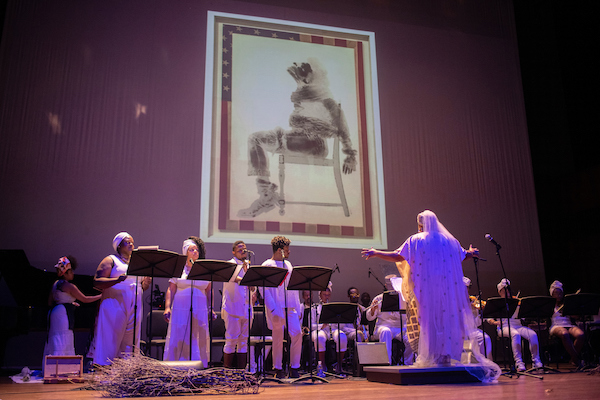Jan 13, 2026 2:09 PM
More Trump-Kennedy Center Cancellations
The fallout from the renaming of the John F. Kennedy Center for the Performing Arts to include President Donald…

Chicago’s Angel Bat Dawid premieres a new work durning the annual Hyde Park Jazz Festival, which ran Sept. 28-29 at locations around the South Side of Chicago.
(Photo: Marc Monaghan)A strong community feeling permeated The Hyde Park Jazz Festival, which ran Sept. 28-29 across twelve different locations on Chicago’s South Side.
When vocalist Maggie Brown, daughter of Oscar Brown Jr., asked an audience if they remembered jazz at the Alley—an outdoor music festival that was held in an alley at 50th and Langley back in the ’60s and ’70s, but recently was resurrected—several hands shot up.
Even though this particular weekend was hampered by rain, a respectable cross-generational and interracial audience still turned up in jackets and long coats to enjoy music outdoors. Indoors, too: a pair of evening shows by Ambrose Akinmusire did turn-away business.
But a special feature of the festival this year was a pair of new commissions by Chicago performers, unveiled at the Reva and David Logan Center for the Arts on Sept. 28th: Angel Bat Dawid’s Requiem For Jazz and Isaiah Collier & The Chosen Few’s Story Of 400 Years. Dawid’s piece offered redemption from hard times, while Collier’s wallowed in them. But both managed to strike a resonant chord with audiences.
Dawid is a familiar name on Chicago’s jazz and improvised music scene, having played with Damon Locks, Jaimie Branch, Matthew Lux and Ben LaMar Gay, even performing in a woodwind duo with Roscoe Mitchell. The bandleader also recently issued her debut full-length, The Oracle, on local imprint International Anthem. But on this afternoon, she led an ensemble, attired all in white, playing a piece that was a response to Ed Bland’s 1959 movie The Cry Of Jazz, which basically asserted that jazz is dead. Toying with the film’s premise, Dawid’s Requiem For Jazz was conceived as a 12-part funeral mass. While it addressed death, the piece seemed relatively cathartic. Dawid often preached to the audience to amplify verbal statements, repeating phrases like a preacher would, and the audience responded in kind. Accompanied by a slide show that illustrated key points in the “memorial service,” the ensemble did a good job of getting their point across. For a supposed interment, the piece had the effect of a New Orleans funeral procession, celebrating rather than burying.
Saxophonist Collier—another local artist with a track record that includes stints with Roy McCurdy, Ernest Dawkins and Bennie Maupin—presented his piece later that same evening, emphasizing suffering more succinctly. Presented as a time machine into the past, Collier announced from the stage that the work “might make people uncomfortable.” (This was met with encouraging shouts of “Come on with it!” and “We ain’t going nowhere!”) With a band augmented by a string section, the music itself was aided by performers silently acting out slave scenes, overseen by a white slave master. Contrary to making the audience uncomfortable, black members of the audience laughed knowingly during a scene that was soundtracked by a song called “Yassuh Boss,” when an African American man showed off his tap-dancing skills for the master. Behind them, the action spurred the band to new heights, with Frank Menzies taking inspired turns on the piano.
Chicago is a festival-happy city, always ready to throw an outdoor bash during the summer for reasons ranging from hot dogs to Lollapalooza. The Hyde Park Jazz Festival did a great job of closing out the season and did so with a pair of provocative premieres. DB

Belá Fleck during an interview with Fredrika Whitfield on CNN.
Jan 13, 2026 2:09 PM
The fallout from the renaming of the John F. Kennedy Center for the Performing Arts to include President Donald…

Peplowski first came to prominence in legacy swing bands, including the final iteration of the Benny Goodman Orchestra, before beginning a solo career in the late 1980s.
Feb 3, 2026 12:10 AM
Ken Peplowski, a clarinetist and tenor saxophonist who straddled the worlds of traditional and modern jazz, died Feb. 2…

The success of Oregon’s first album, 1971’s Music Of Another Present Era, allowed Towner to establish a solo career.
Jan 19, 2026 5:02 PM
Ralph Towner, a guitarist and composer who blended multiple genres, including jazz — and throughout them all remained…

Rico’s Anti-Microbial Instrument Swab
Jan 19, 2026 2:48 PM
With this year’s NAMM Show right around the corner, we can look forward to plenty of new and innovative instruments…

Richie Beirach was particularly renowned for his approach to chromatic harmony, which he used to improvise reharmonizations of originals and standards.
Jan 27, 2026 11:19 AM
Richie Beirach, a pianist and composer who channeled a knowledge of modern classical music into his jazz practice,…